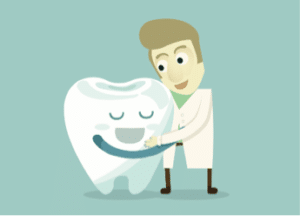By: Rosie Torres, R.D.H.
How many of our senses are affected during a dental appointment? Changes in temperature, pressure and vibrations of dental instruments, gloved hands, water, and suction create endless physical and auditory sensations. Not to mention the bright lights, shades of gray on the X-rays, and the oddly magnified eyeglasses of our clinician hover overhead. For many of us this is all very mundane and typical of a regular routine visit to the dentist. But for people with “Dentophobia”, n. the fear and/or dislike of dentists or of having dental-related procedures, it’s all downright terrifying.
Sink your teeth into this
In the United States, it is estimated that 75% of adults have some level of dental anxiety, ranging from mild to severe. Approximately 5-10% of these people experience dental fears so great, that they avoid dental treatment completely. Unfortunately, this group of people end up requiring more invasive procedures, due to prolonged avoidance. Dentophobias are most commonly found in both younger adults and women than in older adults and men.
So How Do You Know If You’re A Dentophobic?

You may have some form of dentophobia if you find that you worry about some or all of the following:
- Painful procedures/injections and/or experiencing post-procedural pain.
- Anesthetic not working, i.e., not feeling “numb enough” or (alternatively) feeling “too numb.”
- Gagging or having an active gag reflex.
- Feeling like you have no control.
- Being embarrassed about your oral hygiene or dental health
- Choking, suffocating and/or swallowing water.
- Noisy equipment
- Not being able to signal to the treatment provider to stop.
- Being reclined too far back in the dental chair
- Having a serious medical emergency during treatment and/or having a panic attack/fainting
Whether you have an extreme fear of all-things dentistry, or you have more specific dental-induced anxiety…help is on the way!
Here’s how to overcome your dentophobia:

1. Painful procedures/injections and/or experiencing post-procedural pain.
If your dental-related phobia is related to pain, ask about different types of anesthesia. We have everything from mildly flavored numbing gels that are topically applied to the gums to local anesthesia via infiltration (needle). If your fear surrounds needles, there are other options. Oraqix, a non-injectable liquid anesthetic, is applied to the space where the teeth meet the gums and numbs the soft tissues. We also have the Solea Laser, which allows for injection-less, drill-less fillings. As an added bonus, the Solea is also painless, soundless, and sensation-less. Since there is no anesthesia required, multiple areas of the mouth can be worked on during the same visit and there is no post-procedural numbness. Which leads to #2…
2. Anesthetic not working, i.e., not feeling “numb enough” or (alternatively) feeling “too numb.”
If you are afraid to feel “too numb” from the anesthetic, ask your dentist or dental hygienist to start with the lowest concentration in one particular area. If you are still sensitive thereafter, you can make the choice to ask for something stronger. This way, you are not over-anesthesized right from the start, and you can gradually increase (therefore, control) your level of “numb.”
If you are more concerned about not feeling numb enough, have your dental professional carefully test out one particular area that is decided upon to assess your level of numbness. Don’t be afraid to ask for something stronger. It will make the whole procedure easier for both you and your dentist if you are comfortable.
3. Gagging or having an active gag reflex.
Let the clinical staff (dental assistant/hygienist/dentist) know about your gag reflex in advance so that they can accommodate you. Sometimes there is a special way of positioning either the patient or the X-ray sensor in the mouth to prevent the activation of a gag reflex. I also like to have the patient either hold the suction or help me position the suction so that it feels more comfortable for them and less invasive.
4. Feeling like you have no control.
Realize and remind yourself that you are in control of choosing to either receive or decline your dental treatment at all times. For many patients, knowing that they can raise up their left hand during a procedure to indicate needing a short pause alleviates the fear of not being able to voice questions or concerns, such as experiencing discomfort.
5. Being embarrassed about your oral hygiene or dental health.
The mouth is such an intimate, sensitive part of the body and it’s oh-so normal to feel “exposed” and vulnerable when every part of it is being viewed, poked and prodded. The first step is to acknowledge these feelings as being natural and rational. Feelings of anxiety are the body and mind’s way of protecting you and keeping you safe.
Ask your dentist or hygienist to take a peek at your teeth first without a light and a mirror. Communicate that you feel ashamed and embarrassed and that you are worried about what they might think. Once they take that first quick look, you may feel more comfortable and be ready for a more in-depth exam.
6. Choking, suffocating and/or swallowing water.
Communicate these fears to your dentist or dental hygienist. If you know that you typically mouth-breathe, let us know so that we can be sure to use high-speed suction and minimize water flow. We have new suction equipment that is very effective at controlling the water that pools in the mouth. It is also very comfortable.
7. Noisy equipment.
Bring headphones or earplugs to your appointment to drown out the noise. Decide on what type of relaxing music you want to listen to, or you can choose an audiobook or podcast. Forgot your headphones? We have Bose Noise-Cancelling Headphones that are sanitized and are interchangeable with different cell phone manufacturers.
8. Not being able to signal to the treatment provider to stop.
Ask your dental treatment provider to periodically check in with you. I like to check on a patient (with or without dental anxiety) after cleaning each quadrant of the mouth. For example, after working on the lower right teeth from front to back, I will ask the patient if they are doing okay. This way, they know that I am always present in actively assessing their level of comfort. I will also always watch facial expressions and body language. If the patient appears tense or anguished, that means we should pause and reassess.
9. Being reclined too far back in the dental chair.
A simple remedy for this might be to ask to only be put half-back so that it’s more comfortable. Or indicate when you feel that you’ve reached the maximum position at which you want to be reclined. If you have back pain or leg aches, we have positioning pillows that can be put in sanitary sleeves and placed strategically to make you more comfortable.
10. Having a serious medical emergency during treatment and/or having a panic attack/fainting.
Make sure to always provide your up-to-date medical history including any medications that you have stopped or started with corresponding dosages. Also, communicate to your dentist and/or hygienist any recent hospitalizations or surgeries and corresponding diagnoses.
To prevent having a panic attack or a fainting spell, practice the following relaxing breathing technique:
Deep Belly Breathing or Diagphragmatic Breathing
This type of breathing has a relaxing and calming effect on the body. To breathe into your lower belly, inhale slowly through your nose by pushing your stomach out. Breathe in the shape of a square:
- Breathe in to a count of four
- Hold the air in your lungs for a count of four
- Exhale to a count of four
- Hold your lungs empty for a count of four
- Repeat
On the Apple Watch, you can use the built-in Breathe app to practice controlled breathing, or for Android Wear, use the BreatheWell app.
Additional Tips and Key Takeaways:

1. Bring a Buddy.
You jump, I jump right? Although we are not encouraging patients to bring relatives and/or friends with them to their appointment due to the COVID-19 pandemic, you can schedule your dental appointment along with your significant other/friend/sister, etc. Simply having someone with you and knowing that they are being treated right next door to you, can help to alleviate some dental phobia.
2. Mindful Meditation
Prior to your appointment, of course you might experience amplified anxiety. While you may not be able to completely block out negative thoughts, acknowledge having them, but try to focus on the positive. Repeat helpful mantras, such as “I care about my health, so I am going to receive the treatment that is best for me.” “I am going to have a smooth, successful visit.” I will not allow my anxiety to prevent me from doing what is best for myself.” While you focus on positive thoughts and mantras, use visualization techniques to either replay a fond memory, or think about something that you are looking forward to. You can recall these images and associated positive thoughts during your appointment, as well to help ease your fears.
3. Positive Preparations
If you are nervous about being able to express your dental fears in person during your upcoming appointment, tell the front office staff over the phone when you schedule. This allows for the clinical staff to be given advanced notice, which makes us even more prepared to give you some extra TLC when you arrive. Once seated, do your best to have a conversation with the dentist, dental assistant and/or hygienist regarding your dental fears. Perhaps you had one (or a series of) negative experiences at the dentist. Let us know where these fears stem from. Communicate your preferences to us. Sometimes either knowing or not knowing what is going to happen next can be helpful. Decide if you would find a running commentary helpful of all of the steps involved in your dental procedure. Alternatively, if you prefer to not hear an explanation of what’s going on, let your dental professional know.
Made it through your entire appointment?!
Celebrate your victory! Plan a reward for yourself for coming this far without a hitch. You should feel very proud of yourself for overcoming your dental fears. Dentophobia is way more common than you might think. Dentists, dental assistants, and dental hygienists are used to seeing patients who have varying levels of anxiety surrounding their appointment. Gallery 57 Dental has an amazing team of compassionate and experienced staff. We will work with you to help you overcome your fears and improve your dental health. You never know, you just might learn to love coming to the dentist!
Call 212.246.8700 to find out more information or click here to schedule an appointment with Gallery57Dental.
